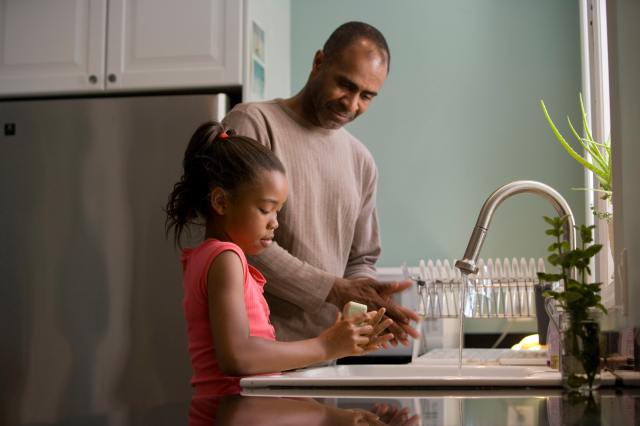
If there is one thing that is becoming more and more clear as we continue to navigate the atmosphere of the global pandemic and national unrest, it is that we are being called upon to live differently. While this article is about reducing your children’s long-term stress related to the toll of COVID-19, I will not be focusing directly on the children but rather, I will be focusing on you.
Good News = Bad News
Do you want the good news or the bad news? The answer is the same for both, but how you perceive the answer will make it good or bad. Here goes…every moment, of every day, you are modeling for your children how to deal with stressful and enormously difficult situations. So, the impact of what we say to them-imparting our sage wisdom-pales in comparison to what they observe in our everyday behaviors.
The fact that our actions speak louder than words can be upsetting as we think about all the ways we behave where we have not been shining examples. Or where we have believed in the motto “do as I say, not as I do.” Let’s shift that narrative to one that both puts the well-being of parents first and provides children what they need during stressful and normal times. This is a win-win for everyone!
Self-Compassion to the Rescue
There are many positive, stress-relieving behaviors that would be valuable to practice, but if I had to pick one as my superpower it would be… self-compassion. A woman I highly respect in this arena is a researcher and author of Self-Compassion: The Proven Power of Being Kind to Yourself, Dr. Kristin Neff. Self-compassion, according to Neff, is showing kindness and understanding toward yourself during challenging times. Showing compassion for yourself means accepting your humanness and opening your heart to the reality that in life “losses will occur, you will make mistakes, bump up against your limitations, and fall short of your ideals.” This is the human condition—a reality shared by all of us.
The three elements of self-compassion include:
- Self-kindness vs. Self-judgment: We all fall short of ours and others’ expectations and ideals so instead of criticizing ourselves we accept this reality with kindness and experience great emotional equanimity.
- Common humanity vs. Isolation: Suffering and personal inadequacy are common human experiences, not something that happens to me alone.
- Mindfulness vs. Overidentification: In order to foster self-compassion we are called to create a balanced approach to our negative emotions where feelings are neither exaggerated nor suppressed.
Sounds great right? I feel calmer just reading them. Living these elements of self-compassion on an ongoing basis is another matter completely. We have many years of opposing behavior so we need to be gentle with ourselves as we build our capacity.
Self-compassion Training Camp
Dr. Neff prescribes guided meditations and exercises to practice. Watch being “judgy” as you read these. They are “touchy-feely” and sweet. So, the bigger your negative reaction to them, the more you need them. Here is one of my favorites:
Supportive Touch: We need a lot of comfort these days with home-schooling, juggling obligations, grappling with the unknown. In these moments activating our parasympathetic nervous system and care system is an easy way to care for yourself. You can do this by putting one hand on your cheek or cradling your face in your hands. Or you can gently stroke your arm or top of your thighs. Basically, anything you would do to calm or soothe your child you do for yourself here.
These simple acts pack a powerful punch. According to the research our skin is super sensitive and when gently touched releases oxytocin which in turn provides security, calms cardiovascular stress, and soothes distressing emotions. I like them because I can do them all day, discreetly and no one even knows I am doing them.
You also do not have to wait until you are in a stressful situation to practice this. Dr. Judith Wright, author of The Soft Addictions Solution, points out that in fact we are way more likely to implement a new behavior in a stressful situation if we have been practicing it regularly. Wright also reminds us that new habits, like being self-compassionate with ourselves, do not take a lot of time but they do take conscious practice.
More Good News
Remember at the start of this article when I said our behavior is our children’s best teacher? Well, the good news is we don’t have to do it perfectly for them to benefit. Your efforts, openness, and willingness to try, make mistakes and be on the path is the most valuable gift you can give them. In fact, they don’t even need to see you practicing, they will feel it and more importantly, so will you.











